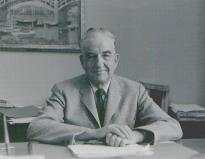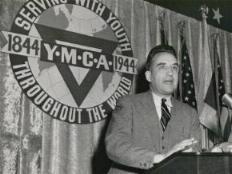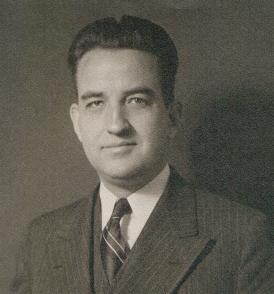 Howard - in his
late 70's
Howard - in his
late 70's Howard, Helen, and collie at their cabin, Northern
Michigan, 1956
Howard, Helen, and collie at their cabin, Northern
Michigan, 1956 Howard, age 44, at one of his many speaking engagements
Howard, age 44, at one of his many speaking engagements Howard in his
30's
Howard in his
30's
6/15/98 Compiled by Roger Hiemstra
 Howard - in his
late 70's Howard - in his
late 70's |
 Howard, Helen, and collie at their cabin, Northern
Michigan, 1956 Howard, Helen, and collie at their cabin, Northern
Michigan, 1956 |
 Howard, age 44, at one of his many speaking engagements Howard, age 44, at one of his many speaking engagements |
 Howard in his
30's Howard in his
30's |
Howard Yale McClusky.
(Howard Y. McClusky; Professor McClusky; HYMc; H.Y. McClusky; Dr. McClusky; HYM)
[source: Roger Hiemstra]
Papers at Syracuse University, Arents Library.
Papers at University of Michigan, Bentley Historical Library.
Letters at National Archives, Washington, D.C.
Papers and other materials possessed by Roger Hiemstra.
[source: Roger Hiemstra]
Born in Whitesboro, NY, son of Frederick William and Lillian (Dean) McClusky. Married Helen Hazel Hartman, August 26, 1930. Children: Edith Lillian, William (dec.), Samuel (dec.), Frederick Yale, and John Evans. Died at Chimney Corners, his summer home on Crystal Lake in Northern Michigan. On the faculty in Education at the University of Michigan. Active in Michigan Council of Churches and the Presbyterian church for many years. Delbert-Clark National Award in Adult Education, 1956. Distinguished Faculty Achievement Award, University of Michigan, 1958. Michigan Legislature Concurrent Resolution of Tribute, 1969. AEA Pioneer Award, 1975. University of Michigan Board of Regents Citation, 1975.
[source: Roger Hiemstra]
February 20, 1900.
Source of birth date:
[WHO'S WHO, Vol. 37, p. 2084]
August, 15, 1982.
Source of death date:
[Letter, August 25, 1982, from Larry Berlin, Chairman, Adult Education, University of Michigan]
1913-18--General Studies, Blackburn Academy, Carlinville, Illinois (pre-college and beginning undergraduate).
1921--A.B., English, Park College, Parkville, Missouri.
1929--Ph.D., Educational Psychology, University of Chicago, Chicago, Illinois.
1933-34--University of London, sabbatical study.
1945--Post-doctoral Fellow, National Council of Religion in Higher Education.
[source: WHO'S WHO, Vol. 37, p. 2084]
1921-22--Teacher of English, Park Academy, Parkville, Missouri.
1923-24--Research Associate (Commonwealth Fund Fellow) with the Commonwealth Fund investigation of visual education under the supervision of Professor Freeman, University of Chicago and Northwestern University.
1924-25--Instructor, Education Psychology, University of Michigan.
1927-34--Assistant Professor, Educational Psychology, University of Michigan.
1934-39--Associate Professor, Educational Psychology, University of Michigan.
1938-45--Assistant to Vice President in Charge of University Relations in the field of Adult Education, University of Michigan.
1939-69--Professor, Educational Psychology, University of Michigan.
1940-42--Associate Director, American Youth Commission, American Council on Education, Washington DC (on leave from U. of Michigan).
1943--Consultant to Office of Civilian Defense and Office of War Information.
1945-48--Director, Bureau of Studies and Training in Community Adult Education, University of Michigan.
1948-64--Establisher and Chair, Department of Adult and Continuing Education, University of Michigan.
1970-82--Professor Emeritus, University of Michigan.
1971--Co-Chair, Section on Education, White House Conference on Aging.
1973-74--Visiting Professor, Adult Education, University of Nebraska.
[sources: Events in the Life of Howard McClusky, prepared by Michael Day for the University of Michigan Archives; annual reports prepared by McClusky]
Adult education.
Adult psychology.
Community education.
Coping, expressive, contributive, influence, transcendence needs.
Educational gerontology.
Educational psychology.
Load-power-margin concept.
Margin theory of needs.
Mental hygiene (forerunner of special education).
[sources: Roger Hiemstra, Keith Main (see publications about); and various pieces written by McClusky (see attached bibliography)]
Judd, Dr. C.; Howard studied under Dr. Judd, successor to John Dewey and head of the Education Department at the University of Chicago.
[source: Roger Hiemstra]
Adult Education Association of the USA (first president, 1951-52) [AEA].
American Educational Research Association [AERA].
American Psychological Association [APA].
Commission of Professors of Adult Education (founding member, 1953) [CPAE].
Gerontology Society.
Michigan Academy of Science.
Michigan Adult Education Association.
National Association for Mental Health.
National Association of Public School Adult Education [NAPSAE].
National Community Education Association [NCEA].
National Education Association [NEA].
National Society for the Study of Education.
National Society for the Psychological Study of Social Issues. Progressive Education Association.
[sources: WHO'S WHO, Vol. 37, p. 2084; publicity release from American Youth Commission, 1945; McClusky's annual School of Education reports]
Coordinated a Kellogg Foundation project designed to establish community development programs in rural Michigan towns, 1935-38.
Founding of the Adult Education Association of the U.S.A., 1950-51.
White House Conference on Aging, 1971.
[source: Roger Hiemstra]
University of Michigan, Ann Arbor, Michigan.
[source: Roger Hiemstra]
A bibliography of his approximately 150 articles, monographs and book chapters is available in a "word" format from Roger Hiemstra via electronic mail or you can click here to see an electronic version.
Griffith, W. S., & McClusky, H. Y. (1980-82). (Series Co-editors). "The AEA Handbook Series in Adult Education." San Francisco: Jossey-Bass.
McClusky, H. Y. (1948). The teacher and the small community. Lincoln, NB: The University of Nebraska Press.
Schorling, R., & McClusky, H. Y. (1936). Education and social trends. Chicago: World Book Company.
Hiemstra, R. (1980). Howard Yale McClusky: Adult education pioneer and statesman. Lifelong Learning: The Adult Years, 4(2), 4-7, 25. [on-line] Available: /hymcllay.html
Hiemstra, R. (1981). The contributions of Howard Yale McClusky to an evolving discipline of educational gerontology. Educational Gerontology, 6, 209-226. [on-line] Available: /hymcedgero.html
Hiemstra R. (1993). Three underdeveloped models for adult learning. In S. B. Merriam (Ed.), An update on adult learning theory (New Directions for Adult and Continuing Education, No. 57). San Francisco: Jossey-Bass.
Jacques, J. W. (1973). Recollections and reflections of professors of adult education: Early 20th century leaders and pioneers in the field (Taped oral interview between Howard McClusky and Joseph Jacques). Syracuse, NY: Syracuse University, George Arents Research Library.
James, J. M. (1986). Instructor-generated load: An inquiry based on McClusky's concept of margin. Unpublished doctoral dissertation, University of Wyoming, Laramie, WY.
Main, K. (1979). The power-load-margin formula of Howard Y. McClusky as the basis for a model of teaching." Adult Education, 30, 19-33.
[source: Roger Hiemstra]
[Postscript: Howard was inducted posthumously into the International Adult and Continuing Education Hall of Fame on April 18, 2002.]
Miscellaneous
Howard was a multi-faceted individual in talent, interests, and professional training. In fact, many disciplines considered him as one of their own. This included adult education, community development, community education, educational gerontology, educational psychology, gerontology, mental health, psychology, public health, rural sociology, and youth work. He also impacted fairly directly through his speaking and publications such areas as English, library science, music, and speech. See /hymcllay.html for more information. He understood well notions of adult development and spoke about them in his graduate courses. He said this during a keynote speech at the 1979 Adult Education Research Conference: We must better understand the adult as a developing learner -- an analysis of the stages of life is required. See /hymcedgero.html for addition insights into the stages of life he experienced and for the following quote:
One interesting conclusion after examining his interests and activities is that Howard has been a man of his own time by changing his primary clients to progressively older people as he himself aged. He spent much of his first 15 years at the University of Michigan helping to train teachers to work with children. During the middle to late 1930s Howard became concerned with educational needs of older youth, especially rural youth. Sometime in the early 1940s he began to develop his interest and expertise in adult education. He continued solidifying this emphasis area, making many valuable contributions to the field of adult education until around the time of his "official" retirement from the University of Michigan.
Modified on May 6, 2002
 -- Cross-reference to Project Vitae in Adult Education
-- Cross-reference to Project Vitae in Adult Education
 -- Cross-reference to the Adult Education History Project
-- Cross-reference to the Adult Education History Project